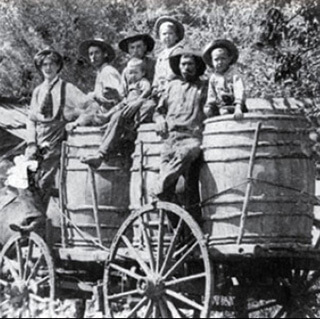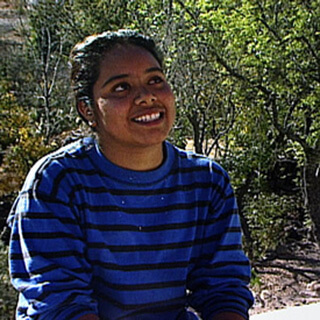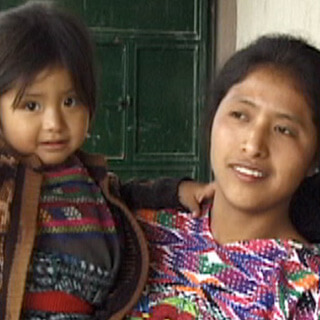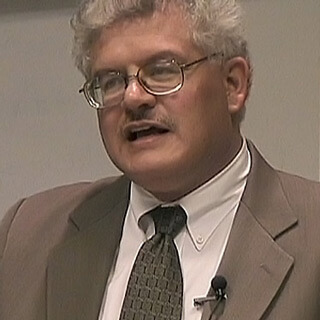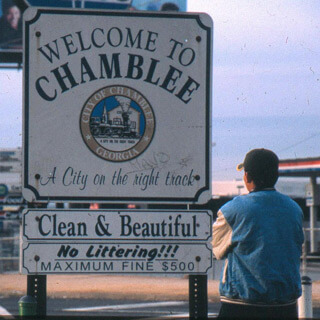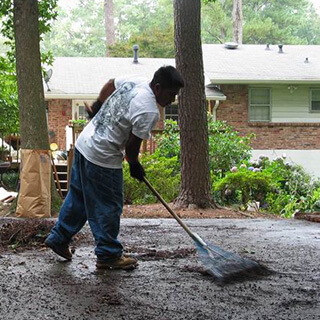Overview
In this interview with Southern Spaces, Charles D. Thompson, Jr., revisits the making of two documentaries that he co-produced: Brother Towns/Pueblos Hermanos (2010) and The Guestworker/Bienvenidos a Carolina del Norte (2007). He discusses his agricultural background, education, experiences that led to documentary work, and current debates over immigration and globalization.
Introduction
 |
| Don Candelario and a vegetable truck from The Guestworker, 2007. |
Charles D. Thompson, Jr., writes about agriculture and migration and has co-produced two documentaries on the subject: Brother Towns/Pueblos Hermanos (2010) and The Guestworker/Bienvenidos a Carolina del Norte (2007). The Guestworker follows Don Cande, a participant in the federal H2A Guest Worker program, through a harvest season in North Carolina and his return home to Durango, Mexico. Brother Towns examines the lives of migrant day workers and the receptions they receive moving between Jacaltenango, Guatemala, and Jupiter, Florida. In this edited interview with Southern Spaces, Thompson discusses his farming experiences and education, why he made these documentaries, their reception, migrant work in Florida and North Carolina, and the prospects for agricultural livelihood under the pressures of globalization.
Ag and Anthro
How did your experiences farming and working as an agricultural organizer in Virginia and North Carolina lead to the making of Brother Towns and The Guestworker?
Thompson: I grew up connected to agriculture. My grandfather was a farmer, and I spent many summers with him. When I was a freshman in college, I lived and farmed with my grandfather and grandmother for a year. I had a strong pull towards farm preservation and sustainability, probably because I realized how special their Appalachian farm was to our family and how rare my experience was. Even growing up in southwest Virginia, I remember having to argue with a couple of classmates about how to tell the difference between a bull and a cow—I couldn't believe how little they knew. They thought it was about the horns! Thinking of a career in teaching about farming, I got an M. A. in agricultural education. After that I became a full-time rural organizer, working with farmers all over the Carolinas. Later I started an organic farm and became president of the Carrboro–Chapel Hill farmers' market.
When I was a farmer, I had several teenagers working with me, helping me pick strawberries. My wife, Hope Shand, and I had a pick-your-own at that point. Then I hired a woman, who was likely in her seventies, and she came with her two grandchildren, and they helped pick. It was very educational for me to see how labor worked in the countryside, how few people there were left doing farm labor, even for just a few hours a week, and how hard it was to find them.
Introduction to H2A program from The Guestworker, 2007.
After my farm really started to produce, I saw that I was going to have way too much work for myself and the few part time people I had found, so I went to a local chicken plant and talked to the manager: "If you could let people know I need some people, I would love to have them after they get off of work to pick some berries." That afternoon at least five guys showed up. They drove out in an old beat up car, and they were all Latino. This was in the mid-1980s, and that day I began to understand the lives of workers from Mexico.
While farming, I began to think and write about the loss of community in rural areas. I was writing some poetry about how the old folks in the community were still working together and how little of that there was left. I realized that many of men who were working on my farm had left farms in their home countries, and my awareness of these issues began to grow.
I organized farmers' markets, and I did a bit of work on the side advocating for small farms. I had done that full time before I started farming, with a group called the Rural Advancement Fund, and I continued working with them. Then I started a project called The Seeds of Hope Farmers' Market Project.
When my questions began to deepen, I went back to school to study the effects of the loss of small farming, but having been influenced by my growing knowledge of Latin American agriculture and advocacy work with Central American refugees as well, I sought to understand agriculture globally. I wanted to learn Spanish and to learn about Latin America, so I could to figure out not only about the places these North Carolina farm workers were coming from, but also what was sending them away.
To back up, briefly, while we were on the farm, Hope and I became a part of Carolina Interfaith Taskforce on Central America, a local advocacy group. This was in the 1980s when the United States was wrongly backing a right-wing dictatorship in El Salvador and was channeling money to Honduran contras who were fighting the democratically elected Nicaraguan government. We knew that there were war refugees from Central America coming to the United States, so we got involved and sponsored two refugees. One, from El Salvador, came to live with us in our house on the farm and a second refugee came from the town of Jacaltenango, Guatemala.
El Sol Neighborhood Resource Center from Brother Towns, 2010.
If you have seen Brother Towns, you know where I am going with this. The Guatemalan refugee was Victor Montejo, a schoolteacher. Soldiers killed his brother Pedro one evening after he celebrated getting his teaching certificate. They targeted leaders in the community, and schoolteachers were among those. Victor was captured, tortured, and thought that he was going to die, but he managed to escape. He came to Pittsboro, North Carolina, where our farm was. We worked with him and taught him to drive. Hope gave him English lessons. He was very smart, a playwright and a poet. We knew that, but we had no idea that he would become an anthropologist with a PhD from the University of Connecticut, then go on to join the Native American Studies Department at UC-Davis. I knew he had written and had stayed in academia, but I fell out of touch with him.
So, back to my being in school at UNC. I knew that I wanted to do dissertation research on Guatemala. Luckily, I had an advisor who had grown up there and got me started going there. I had a pretty fully developed dissertation proposal already approved by my committee when I went to an American Anthropological Association convention in Atlanta, but I thought that I had better find and talk to Victor Montejo before I went to his country. At the Atlanta meetings, I didn't find him at the Guatemala Support Network and the different organizations and meetings where I thought he would be. I was very disappointed. Perhaps I didn't know what he looked like anymore. Then some people said, "I think he is going to be at the plenary session." And to my surprise, there he was, up on stage! The last time I'd seen him he didn't even really speak English, and now he was up on stage sitting beside Coretta Scott King. It was an amazing sight to behold.
I went up after he gave his talk about human rights and said, "I am thinking about going to Guatemala to study, what do you think about that?" and he said, "Let's have lunch tomorrow to talk about it." At lunch, he invited us to go to Jacaltenango and live in his house. We did, and that's how I began Brother Towns. When I came back from Jacaltenango I felt I knew why people left their farms and why they looked for jobs in the United States. Then I began to get to know people in Jupiter, one of the big receiving destinations of migrants from Jacaltenango. Visiting there, I saw so many people, and relatives of people, that I knew from Guatemala. After a year or so there were even more, eventually several thousand people from the Jacaltenango area. By now, I could speak some of their language, as well as Spanish. I knew that in order to give back to people in Guatemala and in Florida that I needed to make a bilingual film in support of the day labor organization in Jupiter, El Sol, that had done such good work.
But I have gotten ahead of myself because Guestworker came first. I worked with Cynthia Hill on that because I had never done any filming at all. Because of my agricultural background and my organizing, and farming, I came back to the United States and, after a couple of fits and starts at other places, got a job at the Center for Documentary Studies. Cynthia Hill lives in Durham and is peripherally related to the Center. She grew up on a tobacco farm and with my background, we began this collaboration. That ended up with the story of two farms: a farm in Durango, Mexico and one in North Carolina, different worlds, but similar issues. I continued developing my documentary skills and a few years later invited Michael Davey to join me as co-director a new film. I also produced a third film, We Shall Not Be Moved, about black farmers with whom I had worked when I was at the Rural Advancement Fund. It's available for streaming free on Folkstreams. All three documentaries are about farm labor and agriculture. All are about people who are trying to keep hold of their farms, although many of them had to leave.
Documentary and its Limits
Why do you like working on documentaries? What are the limits of the form?
My first inclination in going to college was that I wanted to be an art major. I am visually oriented. I like the fine arts, but I also have this political, socially concerned side along with my interest in farming. Making documentaries was a way to nurture some of that artistic side. Even more important, I felt that, especially for the farm workers and the people of Guatemala, I hadn't reached them with my written work. My writing had reached academic audiences and, to some extent, popular audiences in the United States, but I hadn't made something that could be viewable, or understandable, in two languages. Then I started thinking, "If you could do a film in two languages simultaneously then you could have farmers and farm workers in the audience at the same time." Or, later, "Well, you can have these advocates at El Sol who are living in Florida and these retirees or whoever they are who don't speak Spanish in the same room with the Jacaltecas who don't speak English and they all see the same story." Indeed those things did happen with both documentaries, and it has been the medium through which to reach the most diverse audience—in terms of education, language, orientation.
Sometimes I find making documentary films frustrating because they can only be so long and so deep. They can't go into issues and explain things nearly as well as you want to. So you are cutting things that you love all the time. In a book, or even an article, you can go in depth, explaining the violence in Guatemala, for example. In Brother Towns, we had to brush through that so fast that every time I do a Q & A people ask "What happened? What happened with the violence?" So, that is just a reality of that medium, giving up some depth in order to reach broader audiences.
Creating Dialogue
How did you find the subjects of The Guestworker and Brother Towns and form relationships with them?
With the Guestworker, first of all, the North Carolina Growers Association had to buy into this or else we would have had a hard time making the documentary. They did buy into it because we met with them first and, because it is a legal program, they aren't doing anything wrong. They are bringing H2A workers in with federal sanction and visas. None of the workers in Guestworker are undocumented; they have visas. As for Brother Towns, I had already lived in Jacaltenango for a year before I came back to El Sol and met up with people I had known before. A man named Santos, who had since immigrated to the United States, provided music in the documentary.
Crossing the border from Brother Towns, 2010.
The case of the last interview in Brother Towns was a guy named Juan. He only wanted to give his first name, and we only used first names. In some cases we changed names slightly. But we knew that there were so many people of Latin American descent in the area, and the fact that we didn't give any addresses where people could be located, except of course for El Sol, that we were, if anything, using these interviews to help explain why people were inside of that. As you have seen in the film, there is just so much misinformation about what actually goes on in there and we felt that if we could explain that to a few of the interviewees, that we were trying to boost local support and also explain some of the misconceptions. They were really ready to do it. But I think that it had to be because I had built trust, and that took years. For instance, when we talk about how Angela comes through the desert with her boy, Jesus, that was incredible material to get. You couldn't just walk into Jupiter and say, "I am a filmmaker and I want to do a film about immigration," for someone to come forward with a story like that.
When I first met her, Angela was the caretaker for two elderly people—Victor Montejo's parents—where I would go and do field work. Then, later, I was at a park in Jupiter filming a soccer game, and she came up and said, "Carlos!" I said, "Oh my God." It was just this little girl who used to be thirteen and was now married and had a boy and lived with her husband in Florida. So that began the conversation. I said, "Would you talk on film?" and she said "Sure, yeah." This made me feel like I had a ton of responsibility on my shoulders, but I also believed that if we don't try to share these stories, if we don't try to create dialogue, people remain voiceless and in the shadows.
The immigration debate in Jupiter from Brother Towns, 2010.
Then the opposite side of the issue, the right wing talk radio people get all the airtime they want, but spread misinformation. I believe that before you take any stance on immigration, get to know an immigrant. My goal was to get people to tell their stories. Now David Caulkett and those folks were harder to get on camera in many ways because I had no background with them. They would ask these questions like, "Who are you? Who are you with? Why do you want to tell this story?" I would say back to them, "I want to try to tell this story of why immigrants come to the United States, and the major challenges that this raises for local communities and how we can come to some understanding. We need to have all sides presented." And, I also said, "We are going to make this film and we are going to Guatemala." Or, when one guy played hard to get I said, "We are going to make this film anyway, wouldn't you want your voice in it? Wouldn't you want to tell your side of the story and make sure that when people view this they at least hear you?" and he said, "Okay, I'll do it."
Eleven of the anti-El Sol people came to the first screening we did in Jupiter. John Parsons, who was in the film, came up and said, "Well, you told our side of the story: I appreciate it." He wasn't glowing with his review, but he wasn't negative either. He then went on to say, "Why didn't you tell about that illegal immigrant down in West Lake that murdered a police officer?" I said, "Well, I didn't know anything about that for one thing. The other thing is we were telling a story about Jupiter. We weren't telling about all immigrants in Florida. We were just doing one town." I said, "If somebody had died in that story or if those police officers who came in had actually arrested someone, that would have been in the film. But, in fact, the officers came because they thought El Sol was a model, not because they didn't like it. So that is the story that we told. We were there the day they came. If the police officers had been angry at immigrants, we would have shown that." So, that is how the dialogue played out.
POV and Reception
What points of view do The Guestworker and Brother Towns present and how have people and groups responded?
Welcome to Wester Farms from The Guestworker, 2007.
I think that you can tell that The Guestworker is not an advocacy film, per se. We made a decision to try to tell stories rather than make an argument. In The Guestworker, Don Candelario is the primary character with Len Wester taking the supporting role. The documentary has a point of view, and clearly we take a humanitarian perspective about this person who has come from Mexico. But we also made the film knowing that people from the North Carolina Growers Association, the group that Len Wester is a part of, that gave us an invitation to do this film on one of their farms, were going to see the film before it went to a wider television audience. About three hundred farmers saw this film, and as we watched it, I was slightly nervous. At one point in the documentary, Len Wester says, "Welcome to Wester Farms, you're now in hell," and he laughs, and when there is a group of farm worker advocates watch that film they all go, "Oh man!" or something to that effect. And when we showed it to the farmer audience they all laughed. They thought that was really funny because I think they saw the humor in Len's voice and I think that sometimes things get so black and white that we lose the humor and the ability to see nuance. Even in the audience that had a vested interest in bringing these workers to North Carolina, there was a woman in the farm audience who was crying and I thought, "Wow, we have succeeded in ways that we never knew we could."
With Brother Towns, the same kind of thing was happening. We interviewed people who were "anti-immigrant"—for lack of a better term—they were "anti-illegal immigrant," as they would put it. They thought that it was totally wrong to give any assistance or to provide a labor center for undocumented people. I don't use the term "illegal," I am using it because they did. But, the audience, I knew, would also include people like David Caulkett of FLIMEN (FLoridians for IMmigration ENforcement) and John Parsons. Some of these people who were interviewed in the film would want copies of it. I didn't think they would use it on their website as a way to promote their cause to get rid of all undocumented people in the United States, but I did want to depict them accurately so that when they saw this they would say, "Yeah, you represented me the way I said I felt." Indeed, when we interviewed David Caulkett, probably the most vocal and vehement person in the Florida area that we came in contact with, he said, "Thank you for your interview. We talked for over an hour and you didn't interrupt me." He said, "Every time I've ever spoken to the press, they never let me finish my sentences. I always feel that they are attacking me." We were just asking him questions and letting him go. Through this widespread cooperation, we knew we were not making a film for just one group of people who were already convinced.
We knew that El Sol could use this film as a fundraiser, and indeed they did. The first night it was shown at El Sol two people stood up spontaneously, each saying "I want to give one thousand dollars." Others also gave money that night. Just on the spot. So, I knew that the film could be good for them. But at the same time it didn't tell the story as though El Sol had the only viewpoint, and I think that makes for a stronger film. It makes for a way to have dialogue. That is what education is. It has a point of view. I think that any viewer can know where the filmmaker is coming from in both cases and for all of my work. But, I don't try to make fun of or belittle other viewpoints. That is a style of documentary that has become quite well known, where the other person is used and abused, sometimes, where the filmmaker is running after them with the camera, and they are trying to get away. I think the film has created some dialogue and that is what I was after.
Foreign Policy and Local People
How can US foreign policy positively affect Mexico and Guatemala?
We cannot invest billions of dollars in building a better wall or a high tech infrastructure to prevent the immigrants from coming into the United States. I don't want to imagine the United States investing in technology would kill off any human being who even breeches it. But we have indeed invested billions of dollars in stopping the flow.
Going home to Durango, Mexico from The Guestworker, 2007.
We have to understand what is happening at the local level in towns like Durango, Mexico or Jacaltenango, Guatemala, and think about the challenges that people have, not to just think about them when they get to the border and try to stop them with border control vehicles. We should try to look at both the push and the pull factors. What are we doing to pull them here? What is happening there, through the global economy, that is pushing them out? Is there anything better that we could use our billions of dollars for?
If we could reach people and help them figure out ways to build their economy, then I think people would really want to stay home. If you look at the scenery around Jacaltenango and you look at Rio Azul that flows swimming-pool-blue in a river. The mangos grow on trees in your backyard, and you can drink coffee that your neighbor grew. All of your grandparents and your children and everybody live around you. Everything is colorful, and there are celebrations pretty much every month. It is not a bad place to live. You want to stay there, and you just can't.
It is a huge sacrifice for people to have to leave. They don't want to leave Jacaltenango, especially. We should definitely be thinking about what is happening back there. And in appreciation for it, I've often thought, "Maybe there could be some tourism and that kind of development in Jacaltenango. What about fair trade coffee?" Indeed, in Jupiter they are starting that, and there are all kinds of things that could happen as a result of just working with one town. But it needs to be broader than that, it needs to be international. We need to rethink our free trade agreements. We need to think about the little people as we make policy and not just about Wal-Mart or whoever the real beneficiaries are of lowering tariffs.
Globalization, Recession, and the Border
What relationship do you see between economic changes and immigration debates?
Challenges of border crossing from Brother Towns, 2010.
The recession that we have experienced since 2007 has taken a toll. This has been a pattern since the 1930s in the US, and it has been a pattern in the rest of the globe today: as long as the economy is doing well and there is a demand for people to come do the menial jobs, people have turned a blind eye to the newcomers. That was happening in Jupiter as the building boom took off. As we now know, it was all a bubble. People thought that their houses would forever go up in value. They used home equity loans from some place in Wisconsin, or New Jersey, or wherever they came from to build these houses and buy condos in Florida. The building boom was amazing. People such as Burt Reynolds and Michael Jordan were already in Jupiter Island. It was booming from the 1990s.
The immigrants were coming in to do all of the menial labor: cleaning up construction sites, landscaping in a really hot and humid environment. These guys were staying and working in 110, 115 degree heat with one hundred percent humidity, and the heat index at who knows what. They were the ones doing all the work, but when these foreclosures began, the negativity began to skyrocket. This was a national phenomenon, but became more intense in place where there were large, recent immigrant populations.
Certainly September 11th was a factor, as people started to fear who might be coming. The political right wing had an easy time scapegoating immigrants. It took the focus off of a lack of job creation. The immigrants weren't taking someone's job at the office or at the plant, they were doing the farm work or landscaping that residents didn't want to do. Some people say that we may get to the day where we will see somebody who used to work in an office wanting a farm work job, but I doubt that will happen. We also have a large population incapable of doing farm work.
How H2A workers are paid from The Guestworker, 2007.
The problem is much more complex than people want to paint it. The political right oversimplifies it: that these immigrants are here to steal jobs, and they are dishonest people, and so on. It's not that at all. People need to study NAFTA. Why did NAFTA pass? This legislation that made free trade a reality for the United States, Mexico, and Canada started the free flow of goods, including agricultural goods, across borders but made it impossible for people to cross. Small farmers who grow corn but can't even make the cost of their production in Mexico are going to leave the farms. They cannot feed their children; much less make extra income. They go to the maquiladoras, the factories on the border that are a result of NAFTA. Those jobs only pay eighty dollars a week. If you go—which I have done with students—to the border region and consider the cost of living you realize that there is no way that a family of four can make it on eighty dollars a week. I am talking about prices at Wal-Mart—and there are Wal-Marts in Mexico—are almost the equivalent in US dollars to what they are in this country. We think that they are cheap here, but there they are luxury items.
So, I am mainly speaking of Mexicans now, displaced from farms working on the border. They hear that they can make, in a day, what they make in a week—eighty dollars per day if you are picking strawberries. It's so much more complex than a person trying to get ahead. It is about international trade agreements and policies that we have not been foresighted enough about. This age of globalization has created millions, and perhaps even billions, of mobile people looking for a way to make a living. They used to be able to make it on a local level, to at least scrape by. Now that has all been made impossible. I have studied border questions a lot. I have gone four different years to Arizona working on a border project. I traveled all along the 1,950 miles and talked to people who live there. It is such a strong, strong humanitarian cause to work on behalf of the immigrants. There have been thousands of deaths along the border unrelated to the drug trafficking. People are dying to come to the US to do farm work.
Storytelling and Policy
What is the relationship between your filmmaking and policy discussions?
I was just telling somebody yesterday, when I heard about one of their friend's children who had gotten a degree at Princeton and is now doing position papers on immigration policy, I thought, "I can't even imagine writing something that could be called a position paper on immigration that would be used in Congress as a means of writing legislative goals." I was almost feeling bad about it when that person said, "You know there is a place for everybody." Then I started remembering that my job is to tell stories. Yes, I do have some specific ideas about policy, but it comes from lived experience rather than from study of legislative history. For example, my feeling is that—whether Louisburg, North Carolina or Jupiter, Florida—there is a lot of misinformation from television, talk radio, or hearsay.
 |
| People, road, and wall from Brother Towns, 2010. |
So many people don't know immigrants. I lament that we have language barriers in rural places where people can't share stories because, in many cases—like with Len Wester, who is a rich man by comparison with Don Candelario Moreno—they have the same challenges to making their farms pay. They both have cattle; both raise crops; both have to get loans. If people could understand the broader challenges of globalized agriculture, then they might be more sensitive as they get into contact with their local legislator or representatives.
I'd love to make overnight changes in immigration policy. As Mark Twain says, "A lie travels around the world while the truth is still putting on its shoes." It is a great challenge to be an educator today because of the enormous resources being poured into misinformation about immigration. When The Guestworker showed on North Carolina Public Television (maybe Brother Towns will air this fall), and broader, I hoped people would see it who had not thought about immigration policy. One woman in Cary, North Carolina, who had never done anything like this before, gave me a check for two thousand dollars to carry to Don Candelario. That it was not exactly working on policy issues or getting at the root source of this problem, but it was appreciated. I imagine, after she took that kind of stand, that she wouldn't want her elected officials to bash immigrants as so many of them continue to do. They do it to get votes whether their districts depend on the farm labor or not. In Georgia, after the latest anti-immigrant legislation passed without people understanding what went into it, farmers faced a shortage of workers and some crops weren't harvested. There is so much at stake here. These two documentaries turn up in classrooms, living rooms, and churches. That is not exactly policy, but without people, there could be no policy. I believe our job as educators is to make sure communication happens in order to help bring down walls between us, whether physical, cultural, linguistic, or political. The border wall is anti-education. Instead of spending billions to wall ourselves off from problems, these films show there is another way. They show the power of communication and change through stories. Remember when Reagan told Gorbechev to "bring down" the Berlin wall? How much misinformation has flowed in this country since then that has caused us to build our own wall? We have a lot of deconstructing to do.
Recommended Resources
Documentary Works and Links
Brother Towns/Pueblos Hermanos
http://www.brothertowns.com/.
Concerned Citizen of Tillery
http://www.cct78.org/.
The Guestworker
http://theguestworker.com/.
Smith, James. "Guatemala: Economic Migrants Replace Political Refugees." Migration Policy Institute, Migration Information Source, April 2006.
http://www.migrationinformation.org/Profiles/display.cfm?id=392.
We Shall Not Be Moved: A History of the Tillery Resettlement Farm (Free streaming)
http://www.folkstreams.net/film,212.
Thompson, Charles D. "Dream or Déjà Vu? The debate surrounding George W. Bush's proposed immigration reform." Hemisphere (October 2004): 32-39.
———. "Guestworkers: Farmworkers, Filmmakers, Obligations in the Field" in Viewpoints: Visual Anthropologists at Work (Austin: University of Texas Press, 2009): 180-197.
———."The Case of the Jacalteco Maya: Natives of Bleeding Land" in Graham Harvey and Charles Dillard Thompson, eds. Indigenous Diasporas and Dislocations. (Aldersgate, U.K: Ashgate, 2005): 63-84.

